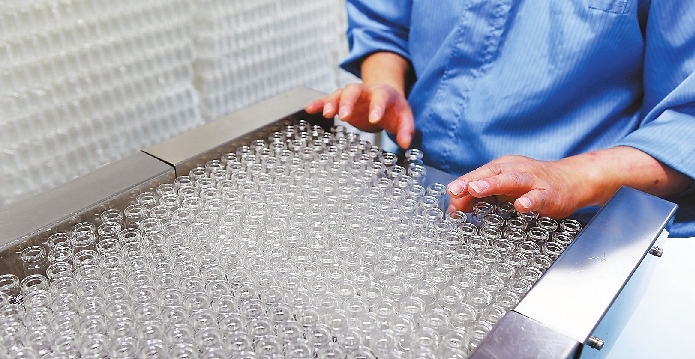
CHINA’S drive to cut health care costs is taking a toll on the profits of its drugmakers. Nearly 70 percent of the 65 drugmakers listed in China have flagged that they are likely to report slower profit growth for the first half of this year. That’s the most since 2016. While some haven’t explained the reasons for the expected weakness, others have pinned it down to China’s focus on slashing drug prices and curtailing the use of medicines with unclear efficacy. China is focused on overhauling its health care system to better meet the expectations of its rising middle class. Part of that has been a drive to reduce the cost of drugs in what is the world’s second-biggest pharmaceutical market by making companies bid for the right to supply 25 off-patent medicines to the 11 cities including Shanghai and Beijing. The new bidding process — which China is looking at extending nationwide — has cut prices on some drugs by as much as 96 percent. “With last year’s purchases now showing impact across the sector, expanding the program will add further pricing pressure on the companies,” said Wang Ruizhe, Shanghai-based analyst at Capital Securities Corp. While the government and the patients have emerged as clear winners of this watershed regulatory reform — the State-run health insurance fund has saved 5.8 billion yuan (US$844 million) in procurement costs — it has roiled drugmakers’ shares and balance sheets. The worst hit have been the generic-drug makers and suppliers of key pharmaceutical ingredients. The 25 drugs that were part of the pilot plan last year ranged from lipid-lowering tablets to those indicated for treating cancer, hepatitis and neurological disorders. Sichuan Kelun Pharmaceutical Co., which won the contract to supply an antidepressant drug under the bulk purchase program, said its first half earnings may slide by up to 10 percent from a year ago on declining revenues from one of its units and rising drug research expenses. Hunan Er-Kang Pharmaceutical Co. said in a July 12 filing that its profit could drop by 43 percent from a year ago, citing changing demand amid the government’s ongoing health care reforms as one of the reasons. Hybio Pharmaceutical Co. expects its profit to slip by as much as 65 percent as the government squeezes its medical insurance spending and competition intensifies amid policy changes such as the ongoing drug procurement program, it said in a filing. “We believe high margins aren’t sustainable for generic drugs in China. The government will continue to put pressure on drug prices to curb escalating health-care costs amid an aging population,” said Nikkie Lu, an analyst with Bloomberg Intelligence. While this new purchase plan caused a lot uncertainty for companies, it is not the only pain point. The nation’s health regulator is also asking hospitals to tighten use of the so-called “adjuvant drugs” that are supposed to enhance the therapeutic effect of another medicine or treatment. Many of these drugs have made it to the State reimbursement list but have dodgy clinical efficacy, forcing a rethink within the government on whether it should spend this money instead on more novel and effective drugs. Hong Kong-listed Sihuan Pharmaceutical Holdings Group said in a July 19 filing that it could even report a net loss for the first six months on an expected impairment due to “possible impact on prescription and procurement patterns” as the government tightens use of adjuvant drugs. Staidson Beijing Biopharmaceuticals Co. said July 12 that its profit could fall 65 percent on declining sales of its nerve injury-drug as the government curbs the use of these drugs while it ramps up research spends. There are some silver linings though. The bulk buying plan, while being extended to more cities, will stay contained to the original list of 25 drugs, sparking a relief rally earlier this month. Also authorities will pick up to three winners instead of one, relaxing the previous winner-takes-all approach and softening the blow. The reforms “won’t necessarily plunge companies into losses but making generics will no longer be as profitable as it used to be,” Capital Securities’ Wang said. Also the pain of these regulatory reforms is unevenly distributed. The impact will depend on the extent of price cuts a drugmaker faces and the share of discounted drugs in its total sales. Zhejiang Jingxin Pharmaceutical Co., for instance, expects to escape unscathed with an earnings growth that matches last year’s. It won contracts to supply three generic drugs under the bulk purchase program — with one medicine that’s just 4 percent of what the foreign maker was charging. (SD-Agencies) | 
